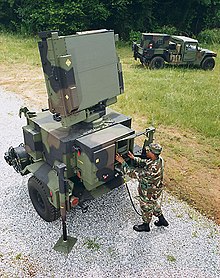AN/MPQ-64 Sentinel
This article includes a list of references, related reading or external links, but its sources remain unclear because it lacks inline citations. (November 2016) |
 A Sentinel radar | |
| Country of origin | United States |
|---|---|
| Frequency | X band |
| Range | AN/MPQ-64: 40 km (25 mi) |
| Altitude | Operating: 3,000 m (9,800 ft) Non-operating: 12,000 m (39,000 ft) |
| Azimuth | 360° |
| Elevation | –10° to +55° |
The AN/MPQ-64 Sentinel is a 3D radar used to alert and cue Short Range Air Defense (SHORAD) weapons to the locations of hostile targets approaching their front line forces. The Sentinel radar is deployed with forward area air defense units of the U.S. Army. First built in 2003, it is an X-band range-gated, pulse-Doppler radar system. The antenna uses phase-frequency electronic scanning technology, forming sharp 3D pencil beams covering large surveillance and track volume. The radar automatically acquires, tracks, classifies, identifies and reports targets, including cruise missiles, unmanned aerial vehicles, and both rotary- and fixed-wing aircraft. It uses a high scan rate (30 RPM) and operates at an effective range of 40 km (25 mi). The radar is designed with high resistance to electronic countermeasures (ECM). Mounted on a towed platform, it can be positioned remotely from the rest of the unit, operated autonomously and communicate with the Fire Direction Center (FDC) via wideband fiber-optic link. It can also distribute its data over a SINCGARS radio network.
Main characteristics[]
- Acquisition and Tracking Surveillance Radar
- Proven X-band, 5D Radar
- 30 RPM (ABT) 20 RPM (ADEF) Rotation Rate
- Low-altitude, medium-range air defense sensor
- Detects fixed- and rotary-wing aircraft, cruise missiles, and UAVs at reduced ranges
- Azimuth: 360 deg; altitude: 40,000 m (130,000 ft); maximum range: 75,000 m (246,000 ft); effective range 40 kilometres (130,000 ft)[1]
- Large Surveillance and Track Volume
- Automatic Programmable Digital Output
- Commercial Off-the-Shelf (COTS) Signal and Data Processor
- Low Side Lobes and Narrow Pencil Beam
- Electronic Countermeasures (ECM) and Anti-Radiation Missile (ARM) resistant
- High mobility, transportability and reliability
- Deployed using modified HMMWV fitted with a 400 Hz on-board generator
- Provides identification of friendly aircraft through IFF
Upgraded version : AN/MPQ-64F1 Improved Sentinel.[]
1. Under an ongoing product modernization program, Sentinel is equipped with new, modern COTS-based electronics which ensures greater performance while implementing a low risk technology insertion. This Improved Sentinel Radar provides a significant range extension improvement.
- Improved target detection at extended ranges
- Improved detection against subsonic cruise missiles and slow-moving Unmanned Aerial Vehicles UAV drones
- Improved target detection for rotary-wing and fixed-wing aircraft
- Improved capability to cue targets beyond visual range
2. The Army has designated the Sentinel radar as an objective force system (to remain in the field until 2030) and has developed a modernization plan to meet those requirements.
3. Multi Mode Sentinel: New operational mode developed for acquisition and tracking of Rocket, Artillery and Mortar (RAM) Fire.
- Software modification provides for quick updates of fielded systems worldwide.
- This new counter mortar mode brings the essential capabilities for 360 degree azimuth detection for RAM fire, and provides rapid information on the origin of the hostile fire as well as an estimate of the impact point of the fire which is useful to warn personnel of imminent danger.
Manufacturer[]
Before its acquisition by Raytheon, the Hughes Aircraft Co. developed the AN/MPQ-64 Sentinel radar at its Fullerton, California, facility, and manufactures it at its Forest, Mississippi, plant.
See also[]
References[]
- ^ "AN/MPQ-64 Sentinel - ThalesRaytheonSystems". 2007-05-14. Archived from the original on 2007-05-14. Retrieved 2021-10-05.
External links[]
- Ground radars
- Military radars of the United States
- Raytheon Company products
- Military electronics of the United States
- Military equipment introduced in the 2000s